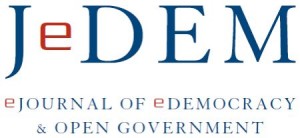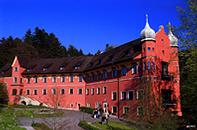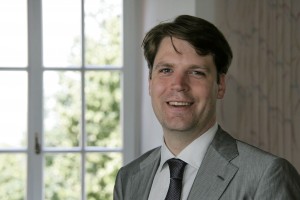Archive for the ‘experince’ Category
 |
10. September 2010 – 15:37 by POLITECH
|
It’s not surprising that any kind of a project has a set of risks that can impair the project’s results. eParticipation projects can be especially exposed to a number of various risks, ranging from poor platform developments, which don’t meet users’ requirements and preferences, to inadequate communication strategies.
Therefore, developing a risk management plan in the early stage of a project is crucial. It allows to identify certain risks, to analyse them and to develop early strategies and solutions that will help in either minimizing their impact on a project or completely avoiding them.
However, the identification of risks at the beginning of a project is not enough, because additional risks might arise during the duration of the project or the proposed solutions and strategies to overcome them might prove to be ineffective. Thus, a continuous tracking and control of such risks is very much desirable. In this respect, the Continuous Risk Management (CRM) paradigm developed by the Software Engineering Institute (SEI) of Carnegie Mellon University (https://www.sei.cmu.edu/risk) can be a valuable strategy. It doesn’t only allow for continuous risk identification and management, but it also helps in assessing risk exposure by combining the impact and probability of the risk.
Posted in experince | No Comments »
 |
8. September 2010 – 22:40 by Institute for Electronic Participation
|
 According to the latest UN E-Participation Index measurement, the majority of South Eastern European countries improved their global standing regarding the quality and usefulness of information and services for the purpose of engaging its citizens in public policy making through the use of e-government programs. Nevertheless, e-participation in SEE countries is still falling behind their e-government developments. An overview of current e-participation situation in SEE within government domain will be presented, highlighting key elements needed for strengthening e-democracy in the region. One of them will be focused on non-governmental organizations and civil society e-participation experience (e.g. on-line Citizen’s forum) needed for shaping inclusive and citizens oriented e-government policy.
According to the latest UN E-Participation Index measurement, the majority of South Eastern European countries improved their global standing regarding the quality and usefulness of information and services for the purpose of engaging its citizens in public policy making through the use of e-government programs. Nevertheless, e-participation in SEE countries is still falling behind their e-government developments. An overview of current e-participation situation in SEE within government domain will be presented, highlighting key elements needed for strengthening e-democracy in the region. One of them will be focused on non-governmental organizations and civil society e-participation experience (e.g. on-line Citizen’s forum) needed for shaping inclusive and citizens oriented e-government policy.
Link to video lecture: https://videolectures.net/forum2010_delakorda_meis/
Link to presentation: https://www.inepa.si/images/stories/mapping_edemocracy_see_region_delakorda.pdf.
Lecture presented by Simon Delakorda, M. Sc., executive director, Institute for Electronic Participation (INePA) and member of the Central and Eastern Citizens Network eParticipation expert group.

Posted in Events, experince, good practice, ICT, members, News, Projects, Tools, Trends | No Comments »
 |
6. August 2010 – 17:28 by Institute for Electronic Participation
|
E-participation & E-democracy workshop was organized as a part of the Citizens Participation University 2010 which took place from 20th to 24th of July in the Civil College in Kunszentmiklós-Kunbábony (Hungary).
10 NGOs representatives and activists from Armenia, Belgium, Hungary, Slovakia, Slovenia, Serbia, Poland and Romania attended the workshop.
Participants were introduced with E-participation / E-democracy concept, political documents of the Council of Europe relating to eDemocracy, current e-participation developments in Central and Eastern Europe and different e-participation tools as well as good practices. The second part of the workshop facilitated open discussion about opportunities for involving e-participation tools into current and future civil society projects in the region.
The workshop was lead by Mr. Csaba Madarász (e-democracy expert and consultant, Hungary) and Mr. Simon Delakorda, M.Sc. (Institute for Electronic Participation, Slovenia)
Citizens Participation University 2010 was organized by the Civil College Foundation and Central and Eastern European Citizens Network (CEE CN).
Csaba Madarász and Simon Delakorda
Workshop presentations:
1. eParticipation in the CEE: NGO’s perspective (pdf, 4,10 mb).

Citizens Participation University 2010 participants @ CEE CN

Simon Delakorda and Csaba Madarász @ CEE CN
Posted in Events, experince, good practice, ICT, members, Tools, Trends | No Comments »
 |
12. July 2010 – 16:33 by POLITECH
|
 On April 22, during the Earth Day 2010, the WAVE Consortium proceeded to the official launch of the second phase: the objective today is to reach 6,000 users over Europe. The first phase gathered more than 300 users in the pilot countries: France, Lithuania and England.
On April 22, during the Earth Day 2010, the WAVE Consortium proceeded to the official launch of the second phase: the objective today is to reach 6,000 users over Europe. The first phase gathered more than 300 users in the pilot countries: France, Lithuania and England.
The ultimate goal for all the partners is to create a community of users and debaters in charge of testing online the WAVE platform and its innovating tool: Debategraph. This forum will use ground breaking graphical techniques to enable everyone, regardless of their level of knowledge, to exchange views and debate on complex climate change issues.
The WAVE Project will end in January 2011, after which the European Commission will decide whether this tool is efficient among others and if it should be used more intensively.
Climate change is one of the most challenging and most serious phenomenons which we must face today. Therefore citizens, special interest groups and decision-makers are invited to mobilize and subscribe, free of charge, to the following websites:
French Pilot Site (https://www.debatclimat.eu)
UK Pilot Site (https://www.jointhewave.org)
Lithuanian Pilot Site (https://www.wave-diskusijos.lt)
WAVE EU Site (https://www.wavedebate.eu)
Posted in experince, Projects, Tools | No Comments »
 |
9. July 2010 – 16:11 by Dorothee Ruetschle (TuTech Innovation GmbH)
|

Photo by fRandi-Shooters on Flickr.com
Europas Netzwerk für ePartizipation PEP-NET – Pan European eParticipation Network – lädt am 23. September 2010 in die historische Speicherstadt der Freien und Hansestadt Hamburg ein. Im Mittelpunkt der von Richard Wilson, dem Begründer von Involve and izwe, moderierten eintägigen Veranstaltung steht das Thema Online-Bürgerbeteiligung – ePartizipation.
Beleuchtet werden insbesondere die Facetten
- ePartizipation in Europa: strategische Ziele vs. Umsetzung
- Die Zukunft der ePartizipation: regional, national und international
- Vorzeigeprojekte der ePartizipation: Berichte aus dem Praxisfeld
Die internationale Tagung ist für die Bedürfnisse von Vertretern aus Verwaltung, Wissenschaft, Wirtschaft und Bürgerorganisationen konzeptioniert. Gerade in Zeiten knapper Kassen stehen verschiedene Ausprägungen der ePartizipation, wie Bürgerhaushalte, die Beteiligung der Bürger an Gesetzgebungsverfahren, Open Data, Bürgerbeteiligung in der Politikfeldgestaltung, cooperative government und Transparenz bei Kommunen, Ländern und Nationen auf der Agenda. PEP-NET widmet sich der Förderung der ePartizipation und schafft mit der Veranstaltung eine besondere Plattform für einen intensiven Austausch, weiterführende Diskussionen und anregende Gespräche mit hochrangigen Persönlichkeiten.
PEP-NET freut sich besonders, die Teilnahme beitragsfrei anbieten zu können. Eine Anmeldung für die limitierte Veranstaltung ist ab sofort über die Online-Registrierung unter https://pep-net.eu/pep-net-summit/ möglich.
Der offizielle Hashtag für die Veranstaltung ist #PEPSUM
Posted in experince, good practice, open data, Projects, TuTech, Uncategorized, Visions | No Comments »
 |
17. June 2010 – 15:19 by Centre for E-Government
|
 Extended Call For Papers – eJournal of eDemocracy and Open Government (JeDEM)
Extended Call For Papers – eJournal of eDemocracy and Open Government (JeDEM)
Issue 3/ September 2010
Special Issue in Collaboration with
PEP-NET: Sustainable eParticipation
Guest Editors
- Rolf Luehrs (PEP-NET, TuTech Innovation GmbH, D)
- Francesco Molinari (SmartIntuitions Ltd., CY)
The eJournal of eDemocracy and Open Government addresses the theory and practice in the areas of eDemocracy and Open Government as well as eGovernment, eParticipation, eDeliberation and eSociety. The aim is to impact the quality, visibility, efficiency and use of research and work in eDemocracy, Open Government and related fields.
Call for Papers
The past decade has seen a significant increase in the number, variety and quality of eParticipation trials, particularly in Western and Southern European countries. The impulse of the European Parliament and the financial support by the Commission have been instrumental in establishing a pan-European community of practice, made up of academia, governments and solution providers from virtually all EU Member States.
Read the rest of this entry »
Posted in experince, good practice, ICT, News, open data | No Comments »
 |
15. June 2010 – 10:13 by E-Voting.CC
|
 Our “EVOTE” Conferences have become an international meeting point for e-voting experts worldwide. This year’s “EVOTE2010″ will be the fourth of it’s kind.
Our “EVOTE” Conferences have become an international meeting point for e-voting experts worldwide. This year’s “EVOTE2010″ will be the fourth of it’s kind.
Today, June 15, the reduced early registration fee ends! (300€ including social events)
From June 16 the price will be 360€.
In order to get the discounted fee, register online today!
The 4. International Conference on Electronic Voting will be held from July 21 to 24 of 2010 in Bregenz, Austria. Please have a look at our internationally casted conference programme here.
We are looking forward to seeing you at the conference in July – so register now!
Daniel Botz – EVOTE2010 Conference Manager
Posted in Debate Europe, Events, experince, ICT, News, Projects, Uncategorized | No Comments »
 |
19. May 2010 – 09:16 by John Heaven (TuTech Innovation GmbH)
|

Photo of Robert Krimmer
When Britons went to vote in the General Election on 6th May, some of them were locked out of the polling booths and were not able to cast their votes. An article on the PublicTechnology website suggested that eVoting could be the answer to this problem, and should be given another chance.
I spoke to Robert Krimmer – Director and Founder of the Competence Center for Electronic Voting in Austria and a founding member of PEP-NET – to find out whether he agreed.
John Heaven: Hi Robert. What is E-Voting.cc, and what do you mean by eVoting?
Robert Krimmer: E-Voting.cc is an Austrian Non-Governmental Organisation (NGO) that fosters the development of eVoting. We deal with any type of eVoting – whether electronic machines in polling booths, internet voting, voting through cash machines, mobile phone voting. The important thing is that the act of casting a vote is done electronically.
JH: So does that include the punch-card system that is used in the United States?
RK: No, that is not included because the votes are counted electronically but not cast electronically. We use the Council of Europe’s definition of eVoting.
JH: You have heard about the problems that UK voters had last week: there were complaints about voters queuing for hours only to be turned away at 10pm. Could eVoting have solved this problem, as discussed in a recent PublicTechnology article?
Read the rest of this entry »
Posted in experince, Interview, members, Trends | No Comments »
 |
17. May 2010 – 10:14 by John Heaven (TuTech Innovation GmbH)
|

Photo of Chuck Hirt
I spoke to Chuck Hirt, from the Central and Eastern European Citizens’ Network (CEECN, a member of PEP-NET) about eParticipation in Central and Eastern Europe. Chuck says that eParticipation along Western European lines is “science fiction” in C&E Europe. On the other hand, people who visit the region are often “inspired by the spirit, energy and enthusiasm” there.
John Heaven: Hi Chuck. Please tell me a bit about CEECN.
Chuck Hirt: The Central and Eastern European Citizens Network gives grass-roots citizens organisations the opportunity to work together, share ideas, and enhance their organisational growth. It started by bringing together staff and citizens from a few organisations across Central and Eastern Europe, who found the meetings really helpful – if anything, just to gain inspiration and energy to take home and continue the struggle.
We found out that several of us were funded by a US donor organisation, the Charles Stewart Mott foundation. They said they would be happy to promote this activity, but asked that we included organisations from further away in the east. We were happy to do this, and our members now come from 19 different countries.
The network is going strong, and we are celebrating our tenth anniversary this year. We are just making preparations for a Citizens’ Participation University. At the moment we are doing some research into the state of participation to act as a base line.
JH: What is the key to the network’s success?
CH: The network was a good place for exchanging stories and experience, putting on training from the start and particularly running a conference every two years. But things started taking off as we began to find way to become proactive and institute events like “Citizen Participation Week”. This was a lot of hard work but gave us a focus. This was quite an exciting moment.
JH: What achievements does CEECN have to its name?
Read the rest of this entry »
Posted in experince, Interview, members, Uncategorized, Visions | No Comments »
 |
17. May 2010 – 09:45 by Civil College
|
During the last member meeting of Pep-net in Krems, we have made several statements about the future perspectives of Pep-net and the paths, how we should get there. A common point of view, that members have shared collectively during the meeting that we need good leadership to the path as well, how we plan to formulate future Pep-net. I am recommending two opinions for designing and planning our common future.
The first one is a connecting discussion in a LinkedIn group:
What are for practitioners the key aspects of good governance and management practices (particularly for NPOs).
Imagine you get suddenly involved in a new NPO, what are for you the fist aspects or characteristics to look at to get an idea whether they are “best-in-class” or rather “not at al best-in-class”? In fact, what is your ‘short check list’ to get your first impression?
The group discussion contains several key document links, which can help to formulate an opinion about an organization’s state of management.
The other one is a book, that I strongly recommend to all readers – if you have not read the great book Leadership from Below from Trond Arne Undheim, which is giving a great perspective, how to lead an organization, from below of yourself.
 Happy Monday to all readers!
Happy Monday to all readers!
Posted in experince, good practice, Trends | No Comments »





 On April 22, during the Earth Day 2010, the WAVE Consortium proceeded to the official launch of the second phase: the objective today is to reach 6,000 users over Europe. The first phase gathered more than 300 users in the pilot countries: France, Lithuania and England.
On April 22, during the Earth Day 2010, the WAVE Consortium proceeded to the official launch of the second phase: the objective today is to reach 6,000 users over Europe. The first phase gathered more than 300 users in the pilot countries: France, Lithuania and England.




 Happy Monday to all readers!
Happy Monday to all readers!






